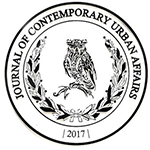
Journal of Contemporary Urban Affairs
ISSN 2475-6164 (online)
Conflicts of interest (COIs, also known as ‘competing interests’) occur when issues outside research could be reasonably perceived to affect the neutrality or objectivity of the work or its assessment. This can happen at any stage in the research cycle, including during the experimentation phase, while a manuscript is being written, or during the process of turning a manuscript into a published article. Potential conflicts of interest must be declared — whether or not they actually had an influence — to allow informed decisions. In most cases, this declaration will not stop work from being published nor will it always prevent someone from being involved in a review process.
If unsure, declare a potential interest or discuss with the editorial office. Undeclared interests may incur sanctions. Submissions with undeclared conflicts that are later revealed may be rejected. Published articles may need to be re-assessed, have a corrigendum published, or in serious cases be retracted. For more information on COIs, see the guidance from the Corrections and Retraction Policy.
Conflicts of interest do not always stop work from being published or prevent someone from being involved in the review process. However, they must be declared. A clear declaration of all possible conflicts – whether they actually had an influence or not – allows others to make informed decisions about the work and its review process.
If conflicts of interest are found after publication, this may be embarrassing for the authors, the Editor and the journal. It may be necessary to publish a corrigendum or reassess the review process.
Conflicts include the following:
Reviewers: Before accepting the invitation to review a paper, potential reviewers are required to disclose any conflict of interest.
Note: The publisher and editorial board of the Journal of Contemporary Urban Affairs follows COPE's guidelines in dealing any allegations.
Journal of Contemporary Urban Affairs
ISSN 2475-6164 (online)
Contact: Publisher / Editorial Office of the Journal
Publisher: Alanya Üniversitesi, https://www.alanyauniversity.edu.tr/
Editor-in-Chief: Dr. Hourakhsh Ahmad Nia, Alanya University
Follow us on: Facebook / Twitter / Instagram / LinkedIn
This journal is published through an Open Journal System as part of the Public Knowledge Project (PKP).
This journal is licensed under a Creative Commons Attribution 4.0 International (CC BY) license.
![]()